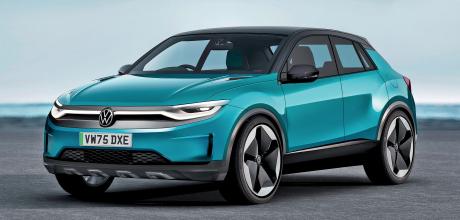Crucial Volkswagen SUVs - three new EVs in revamp
VW pivots EV strategy to include three crucial SUVs. Reinvented ID line-up gains high-tech flagship, Tiguan equivalent and entry-level SUV.
ELECTRIC TIGUAN AND VW’S OTHER NEW SUVs
Volkswagen is preparing to launch a trio of crucial new electric SUVs under a revised ID model strategy recently implemented by its CEO, Thomas Schäfer. The three new SUVs have been conceived to provide the German car maker with a broader spread of electric models in each of Europe’s key market segments. They will build on the foundations laid by the ID 4 and ID 5 – both of which are set to be upgraded with more powerful electric drivetrain options later this year, prior to receiving a facelift and more contemporary digital interior functions in early 2024. Included in Volkswagen’s electric SUV plans are a pair of big-selling new crossovers – one mid-sized and the other much smaller – both aimed at traditional volume segments, plus a luxurious and highly advanced range-topper that will serve as a halo model for the company’s all-EV line-up.
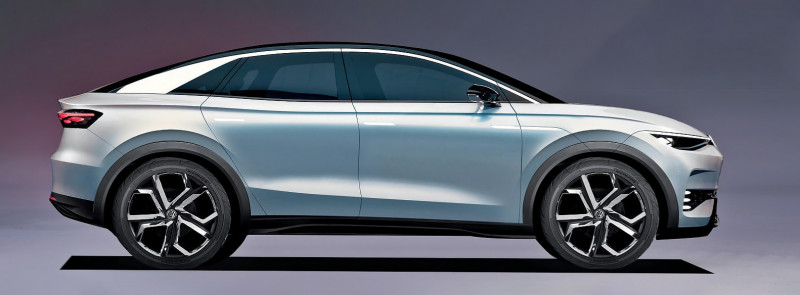
The electric Tiguan has a more traditional and upright exterior design than the ID 4 and ID 5
RADICAL REINVENTION FOR TIGUAN
The first to arrive will be what insiders at the company refer to as the electric Tiguan. Described as having a more traditional and upright exterior design than the ID 4 and ID 5, it is tentatively planned to be introduced in 2025.
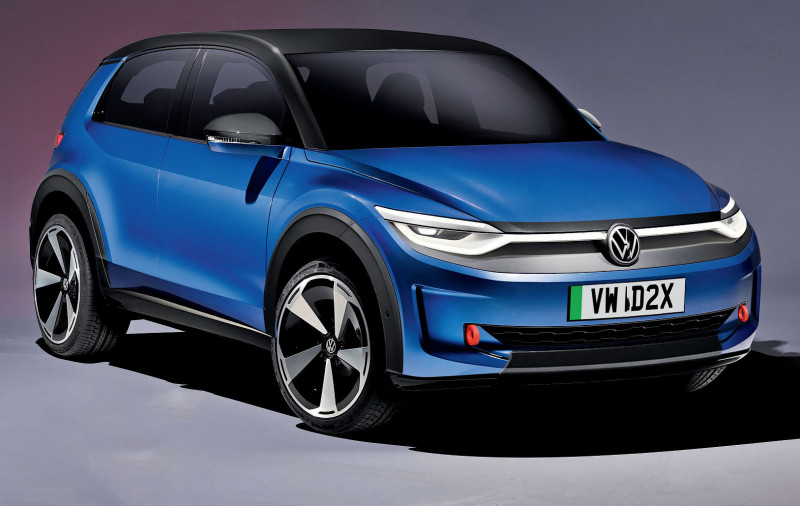
Secrecy surrounds the new model, although it is expected to offer the choice of both rear-wheel drive and four-wheel drive along with a standard five-seat and optional seven-seat interior layout.
The basis for Volkswagen’s upcoming mid-range electric SUV is the company’s new MEB+ architecture – a further developed version of today’s MEB structure announced by Schäfer in 2022.
“The MEB still has a lot of potential. Our goal is to take the platform to the next level,” he said. “To achieve this, we are investing substantially in upgrading it.
With the MEB+, we will then be in an excellent position for the years to come.”
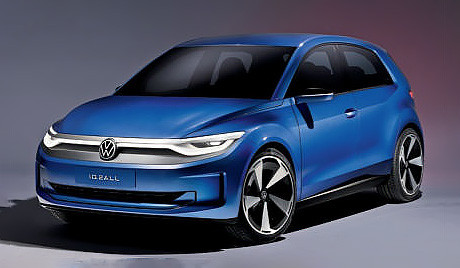
Set for launch in 2028, the new range-topping ID SUV is based on the Scalable Systems Platform.
Among the key developments planned for the MEB+ is the adoption of new unified battery cell technology, which, Volkswagen has confirmed, is earmarked to be introduced in 2025. This suggests the electric Tiguan will not be launched before the middle of the decade.
The MEB+ platform will enable higher charging speeds and greater ranges than those achieved by MEB models today, meaning the Tiguan EV will advance beyond the 170kW charging capacity and 324-mile range offered by the ID 4 Pro’s 77kWh battery.
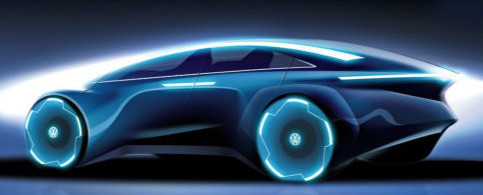
Although there have been suggestions that the electric Tiguan could replace the ID 4 and ID 5, this is denied by Schäfer, who indicates the three models will co-exist alongside each other in an expanded Volkswagen line-up. “This is the world’s largest vehicle segment, which is also home to our popular Tiguan. The new model can complement our ID 4 and ID 5,” he said.
A sign of just how advanced Volkswagen’s plans for an electric Tiguan are is the confirmation that it will be produced alongside the recently facelifted ID 3 in Germany.
In preparation for the model’s arrival, Volkswagen is investing €460 million (£406m) in the transformation and retooling of its Wolfsburg manufacturing headquarters, with work due to be completed by the end of 2025.
Speaking about the plans, Schäfer said: “We are working closely with the works council to bring another electric model based on the MEB+ to Wolfsburg. This will be a high-volume model in the SUV segment.”
UPCOMING £22,000 ID 2 SPAWNS CROSSOVER
Following the arrival of the electric Tiguan, Volkswagen plans to introduce a new entry-level SUV as an electric alternative to the existing T-Cross. Closely related to an upcoming new entry-level Skoda SUV and the production version of Cupra’s Urban Rebel, the most affordable of Volkswagen’s future ID SUV models is tentatively scheduled for launch in 2026, possibly wearing the ID 2X name.
As with the ID 2 hatchback revealed by Volkswagen last month, the compact SUV is set to be offered exclusively with a single-motor, front-wheel-drive configuration. DrivesToday’s sources say it is also scheduled to adopt Volkswagen’s unified cell battery technology with LFP chemistry.
Riding higher and expected to cost slightly more than the ID 2 supermini, which is targeting a £22,000 base price, the ID 2X is expected to be built alongside its sibling and their Cupra and Skoda equivalents on the new production line that the Volkswagen Group is building near Barcelona for its smallest EVs. Batteries will be supplied by an associated factory based nearby, in Sagunto, and operated by the company’s new PowerCo division.
Volkswagen has already confirmed that the smaller MEB architecture can accommodate batteries of either 38kWh or 56kWh capacity and, so equipped, any ID 2 SUV could reasonably be expected to offer between 180 and 260 miles of range, based on the supermini’s claimed maximum of 280 miles. The peak charging speed will be 125kW, which will enable a 10-80% top-up time of 20 minutes.
TRINITY REBORN AS TECH-LADEN SUV
The most expensive and advanced of the three new SUVs is already under development at Volkswagen’s Braunschweig R&D centre in Germany and is a “premium-market crossover-cum-SUV” that has evolved from the company’s troubled Trinity project.
Described as a “technological showcase” for Volkswagen’s electric drivetrain and software capabilities, it will occupy a position in the line-up between the existing Tiguan and Touareg. It will be available with both rear-wheel-drive long-range and dual-motor performance drivetrains, according to Volkswagen sources with knowledge of the company’s future model plans.
Set for launch in 2028, the new range-topping ID SUV is based on Volkswagen’s Scalable Systems Platform (SSP) – a new electric car structure initially engineered under Schäfer’s predecessor, Ralf Brandstätter. Among the developments set to be included on the SSP is a new 800V electric architecture. This will allow Volkswagen’s new electric flagship SUV to support charging beyond 350kW as well as bi-directional charging functionality at higher capacities than that offered by today’s ID cars.
The SSP is also destined to receive Volkswagen’s new unified battery cell technology. Aimed at providing a consistent battery packaging design across all future volume models within the Volkswagen Group, it features a standard prismatic cell design but is claimed to be able to support a number of differing chemistries. These include LFP cells for more affordable models and NMC cells with a high nickel content for premium cars.
Although it’s still early days, Schäfer is said to have outlined similar development targets for the new Trinity SUV as those of the saloon originally proposed by Brandstätter in 2021. Among them are a 435-mile range, level-four autonomous driving capability, and a Cariad-developed software package that will allow buyers to purchase new features and upgrade their car via 5G over-the-air connectivity.
Design details of Volkswagen’s future range-topping electric model remain- tightly under wraps, but the suggestions are that it could eventually supplant the Chinese-market ID 6 – a 4878mm-long model that offers seating for up to seven in three rows of seats – on sale since 2021.
Produced by Volkswagen’s Chinese joint-venture partners FAW and SAIC, the MEB-based ID 6 comes with a dual-motor, four-wheel-drive set-up that develops a combined output of 302bhp. It is mated to a 77kWh lithium ion battery that enables a range of up to 280 miles on China’s CLTC test cycle.
E-ROC INBOUND?
Meanwhile, Volkswagen denies it is planning a new electric crossover modelled around its combustion-engined T-Roc after it was revealed it had filed an ‘ID Roc’ trademark registration with German authorities. A Volkswagen spokesperson told DrivesToday plans have been established for a successor model to the existing T-Roc, which was originally introduced in 2017. Already under development and planned for UK launch in 2026, the MQB-based model is set to be the firm’s last new combustion car, prior to VW going all-electric from 2033.
The spokesperson said: “The move to trademark the ID Roc name is future-proofing. We don’t have immediate plans for an electric T-Roc, but we see a model like this in the future. The current internal-combustion- engine T-Roc is one of our best-selling models, so we will not abandon this segment.”
Today’s ICE Tiguan will be reinvented for an EV future.
Bigger VW SUVs will use more advanced tech than the ID 3.
MEB+ electric Tiguan is due to arrive in 2025.
Compact ID 2X will be an entry-level SUV.
ID 2all previews a £22k hatchback that will go on sale in 2026.
Flagship is an evolution of the Trinity project.


